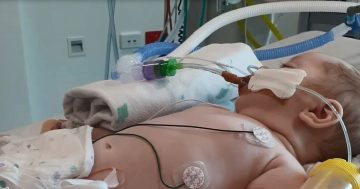 The Department of Health has declared that babies born in WA will now be screened for a further life-threatening condition as part of the newborn heel prick test.
The Department of Health has declared that babies born in WA will now be screened for a further life-threatening condition as part of the newborn heel prick test.
In a statement, the Department said the Newborn Bloodspot Screening Program had been expanded to include spinal muscular atrophy (SMA), a genetic neuromuscular condition which could be life-threatening.
“SMA is an inherited condition that affects nerves leading to the muscles, preventing the muscles receiving messages from the brain,” the Department said.
“Over time, the muscles become weaker and waste away,” it said.
“Initially, babies born with SMA appear perfectly normal. However, untreated babies don’t often reach milestones like sitting or rolling in early infancy, are floppy and have progressive weakness and loss of motor function.”
It said that while there was no known cure for SMA, recently approved therapies, if administered early, could provide dramatic improvements in the quality of life and lifespan of babies born with the condition.
“SMA occurs in one in 10,000 live births and being untreated is the number one genetic cause of death for children under the age of two,” the Department said.
“Babies born in WA are screened for around 25 serious disorders. Of those screened, around one in every 1,000 has a congenital condition that would otherwise have gone undetected,” it said.
Minister for Health, Amber-Jade Sanderson said screening programs like the Newborn Bloodspot Screening Program, were vital and offered babies with rare genetic conditions the chance to receive treatment earlier than they otherwise would.
“Early intervention leads to better health outcomes for newborns and their families, which is why the newborn heel prick test is so important,” Ms Sanderson said.
“Expanding the heel prick test to include SMA here in Western Australia will save lives and prevent long-term issues,” she said.







